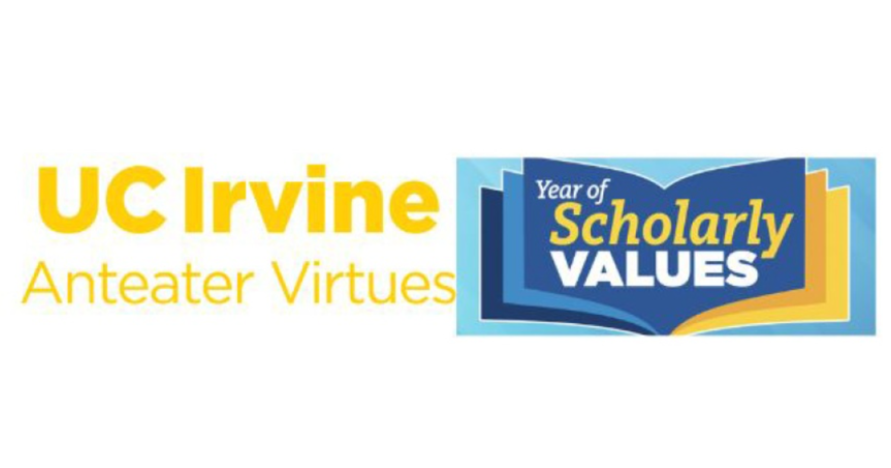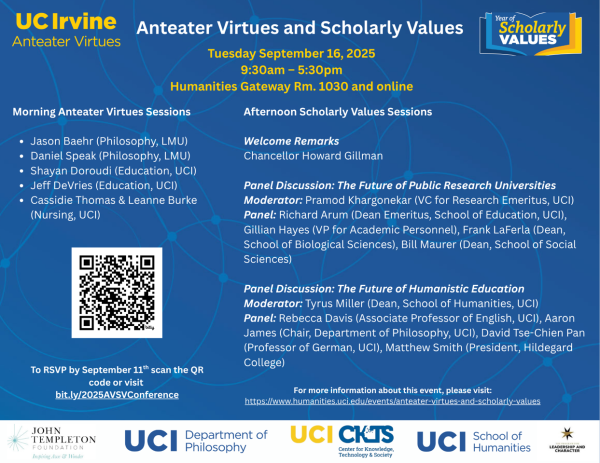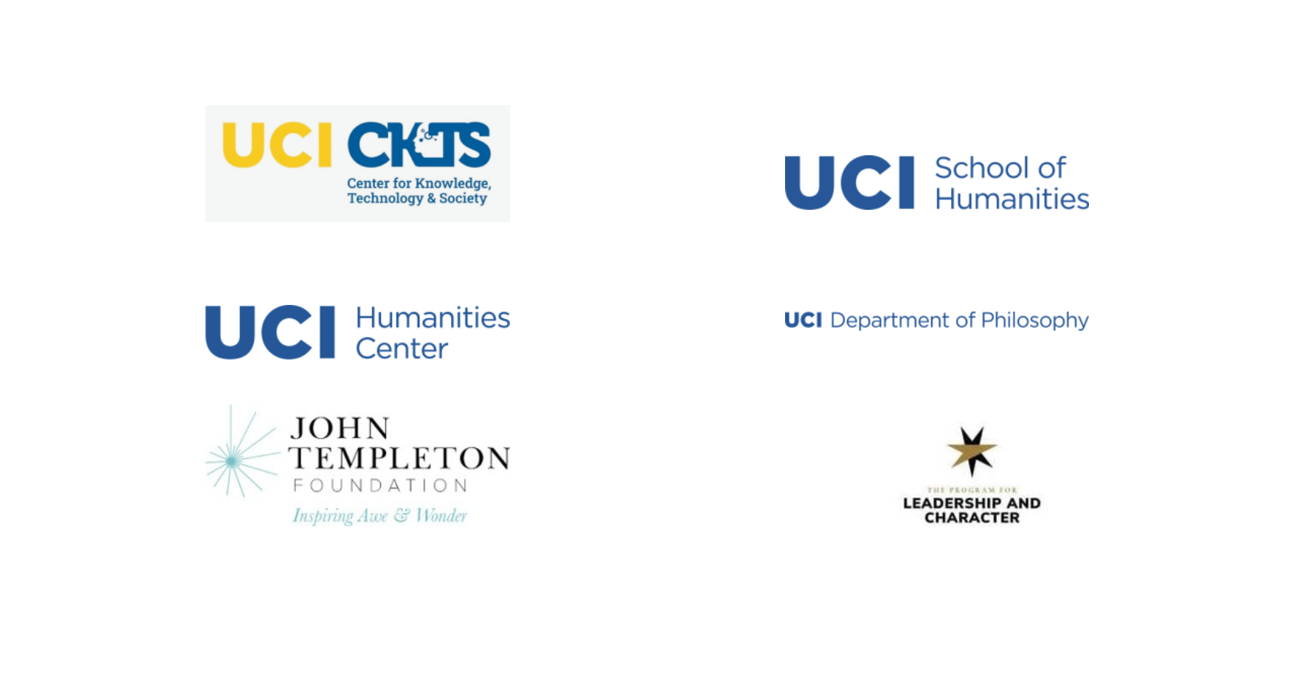
RSVP FOR IN-PERSON OR ONLINE BY SEPTEMBER 11, 2025
Anteater Virtues and Scholarly Values
Join us for Anteater Virtues and Scholarly Values, a full-day hybrid conference event exploring the role of intellectual character in education and the evolving mission of universities. The event will showcase recent efforts highlighting the role of the four Anteater Virtues at the heart of a UCI education: curiosity, integrity, intellectual humility, and intellectual tenacity. As the Year of Scholarly Values concludes at UCI, the event will also feature afternoon panels addressing the future of humanistic education and public higher education in an age of rapid technological and social change.
Tuesday September 16, 2025
9:30 AM - 5:30 PM
Humanities Gateway 1030 or Virtual
To register and to find out Conference Agenda, please click the following link:
Register for In-Person or Online
By September 11, 2025

Anteater Virtues and Scholarly Values
9:30 – 10:00 AM☕ Morning Welcome Coffee
9:45 – 10:00 AM Welcome & Opening Remarks
Duncan Pritchard (Philosophy, UCI)
10:00 – 10:30 AM Keynote: ‘From Civility to Intellectual Virtue’
Chair: Duncan Pritchard (Philosophy, UCI)
Speaker: Jason Baehr (Philosophy, LMU)
It’s a truism that public discourse suffers from a lack of civility. This seems like a problem for democracy. Yet calls for civility in public discourse also can be problematic. I’ll discuss some objections to civility as a norm for public discourse and argue that virtue epistemology offers a promising way of understanding this norm.
10:30 – 11:00 AM ‘Virtues, Values, Vocation’
Chair: Rory O’Connell (Philosophy, UCI)
Speaker: Daniel Speak (Philosophy, LMU)
Intellectually virtuous people are marked by a set of dispositions to pursue epistemic goods. But there are a LOT of epistemic goods out there—so much to know and understand, so many truths to apprehend and appreciate. Sadly, though, we are finite creatures with a limited capacity, which means that we cannot pursue all the epistemic goods. How do intellectually virtuous people decide to distribute their cognitive energy? Following Robert Adams in the moral domain, we will ask whether some epistemic projects or pursuits might be a part of one’s “calling” or “vocation.” Our hopeful answer to this question will also include a few quick suggestions about how to discern one’s particular epistemic vocation.
11:00 – 11:30 AM ☕ Morning Coffee Break
11:30 – 12:00 PM ‘Virtuous or Viceful? Students’ Use of AI in the Anteater Virtues Course’
Chair: Fernando Rodriguez (Education, UCI)
Speaker: Shayan Doroudi (Education, UCI)
There is widespread concern that students are using generative artificial intelligence (AI) tools to do their coursework for them. Such behavior would indicate a lack of intellectual character. On the other hand, many suggest that AI could be used responsibly as a tool for learning. But how much are students actually using AI and how virtuous is their AI usage? To study this directly, we recruited UCI students to complete the Anteater Virtues Foundation modules, which we augmented with seven short answer questions. For over 70 students, we examine the content and meta-data of their responses to the short answer questions to determine the degree of intellectually viceful AI usage and compare this with self-reported intellectual virtue measures and self-reported claims of AI usage.
12:00 – 12:30 PM ‘Intellectual Humility in the Classroom’
Chair: Julia Lerch (Sociology, UCI)
Speaker: Jeff DeVries (Education, UCI)
This talk explores class environment and pedagogical techniques associated with students’ intellectual humility in the classroom. Intellectual humility is an important academic virtue, describing a person’s willingness to consider alternate points of view and their understanding that their knowledge may be incomplete or wrong. We conducted multiple surveys measuring classroom-specific student and teacher intellectual humility. Higher levels of teacher intellectual humility, interactive instruction, high teacher expectations, and consistent and effective feedback were associated with increased student intellectual humility.
12:30 – 1:00 PM ‘Anteater Virtues in Nursing’
Chair: Mark Lazenby (Nursing, UCI)
Speakers: Cassidie Thomas & Leanne Burke (Nursing, UCI)
Nursing is consistently ranked among the most trusted professions and is central to advancing high-quality, compassionate care across diverse healthcare settings. This care is grounded in a profession that prioritizes integrity, compassion, and humility. At the UC Irvine Sue & Bill Gross School of Nursing, prelicensure students engage in rigorous preparation for the moral, ethical, and clinical demands of nursing practice. However, students enter the program with varying levels of ethical awareness and moral development. The Anteater Virtues of curiosity, integrity, intellectual tenacity, and intellectual humility offer a meaningful framework for bridging these differences, enabling students to apply core intellectual virtues to complex clinical scenarios. In this session, we will share how we partnered with the Anteater Virtues Project to integrate these virtues into two prelicensure nursing courses, including the development and implementation of the Anteater Virtues Nursing Capstone Project. We will also discuss lessons learned and plans for continued improvement and integration of the Anteater Virtues into these two courses.
1:00 – 2:00 PM Lunch Break
Afternoon Focus: Scholarly Values
1:45 – 2:00 PM ☕ Afternoon Welcome Coffee
2:00 – 2:15 PM Welcome Remarks
Chancellor Howard Gillman
2:15 – 3:45 PM Discussion Panel — The Future of Public Research Universities
Moderator: Pramod Khargonekar (Distinguished Professor of Electrical Engineering & Computer Science; Vice Chancellor for Research Emeritus, UCI)
Panel: Richard Arum (Dean Emeritus, School of Education, UCI), Gillian Hayes (Robert A. & Barbara L. Kleist Professor of Informatics; Vice Provost for Academic Personnel, UCI), Frank LaFerla (Distinguished Professor of Neurobiology and Behavior; Dr. Lionel and Fay Ng Dean, School of Biological Sciences, UCI), Bill Maurer (Professor of Anthropology, Law, and Criminology, Law & Society; Dean, School of Social Sciences, UCI).
Across the country, public research universities are facing intense budgetary strain as federal research funding is being disrupted with the potential for sharply reduced funding in the coming years. Constrained state support and rising costs are further exacerbating this budgetary situation compounded by a multitude of prevailing headwinds. There is a hostile political climate in which universities are viewed as ideologically biased. There is also the relatively new phenomenon whereby academic research is no longer as widely trusted as it once was. There are a number of sources for this distrust. To give two examples: the replication crisis has undermined trust in some core areas of scientific research and the perceived politicization of academic research has undermined trust in its objectivity. A further threat to research universities comes in the form of the new AI technology, which some commentators have argued can take on a range of research and education tasks and could disrupt universities. This panel will discuss how public research universities can address these challenges, reconsider their missions, develop new visions for a brighter future, and earn public trust.
3:45 – 4:00 PM ☕ Afternoon Coffee Break
4:00 – 5:30 PM Discussion Panel — The Future of Humanistic Education
Moderator: Tyrus Miller (Dean, School of Humanities, UCI)
Panel: Rebecca Davis (Associate Professor of English, UCI), Aaron James (Chair, Department of Philosophy, UCI), David Tse-Chien Pan (Professor of German, UCI), Matthew Smith (President, Hildegard College)
The idea of humanistic education, which has long been at the heart of higher education, is facing unprecedented challenges from multiple sources. There are political and cultural challenges, as the educational value of the humanities is called into question. For example, are the distinctive skills gained via a humanistic education not valued by employers, as many critics suggest? And is it really true that the humanities have been ‘ideologically captured’ as some political commentators have argued? There are wider social challenges, not least in the form of the new wave of AI. Why should we value the critical reading of great works, for example, when the AI can summarize any text for us in moments? And then there is the impending ‘demographic cliff’ in student enrollments, which threatens to have a disproportionate effect on the humanities. How should we resist these multiple challenges to a humanistic education? What will the humanities look like a generation from now? Could this pivotal moment in higher education in fact be an opportunity to remake the case for humanistic education and demonstrate its central importance for our scholarly values? How should we go about defending the value of reading, thinking and discussing in a critical and open manner to a new technological age? Is there any truth to the claim that as the economy continues to turn to AI solutions, industry will seek workers and leaders who are equipped with an understanding of the “human?” These are some of the issues that will be explored by this panel.
This event is co-sponsored by:

For more information about the UC Irvine Anteater Virtues check out UC Irvine Anteater Virtues
